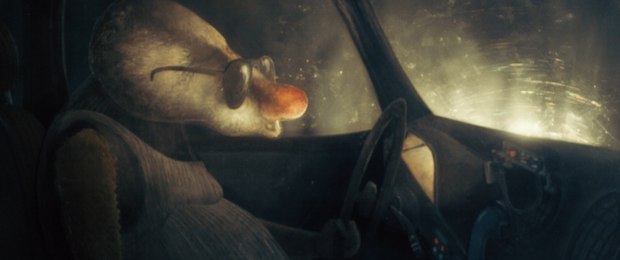Slovenian stop-motion short co-produced by RTV Slovenija and Croatia’s Bonobostudio is the follow-up to the widely acclaimed 2013 short film ‘Boles.’

The ravages of alcoholism are explored in Špela Čadež's deeply personal, tragicomic ‘Nighthawk.’ (All images © Bonobostudio/RTV Slovenija)
From its debut at the 2016 Ottawa Festival to its Grand Prize win at HAFF, the Slovenian stop-motion short Nighthawk has stunned and mesmerized audiences and juries with its blunt, tragicomic depiction of a boozy badger on a blurry drive through darkened streets.
Co-produced by RTV Slovenija and Croatia’s Bonobostudio, Nighthawk is the creation of Slovenian stop-motion director Špela Čadež and scriptwriter Gregor Zorc. The follow-up to Boles, the duo’s widely acclaimed 2013 collaboration, Nighthawk is a deeply personal and honest portrait of the destructive, demoralizing and pitiful effects that unhinged alcohol feasting can have on a person.
It’s an everyday, universal problem that affects far too many people -- including the inspiration for the film, Čadež’s father. “There was a moment,” recalls Čadež, “when we were at my parent’s place. My dad was so drunk that he couldn’t stand up anymore. He was lying on the floor, and this was the moment where I realized I have to make a film about it, because it was so heavy on me. I had this feeling of, ‘I don’t really have feelings for him anymore. I don’t care if he ever stands up on his feet.’”
More than a year in the making, what elevates Nighthawk above many films that deal with substance abuse is Čadež’s refusal to judge. In Nighthawk -- which at times feels like a synthesis of the spellbinding tension of Claude Lelouch’s 1976 short, C’était un rendez-vous, with the dirty realism of Charles Bukowski -- Čadež creates an impartial snapshot of the waning moments of a long day of drinking. “I wasn’t really trying to moralize,” says Čadež, “or provide any sort of solutions, because I don’t have them. I just wanted to deal with a subject that’s difficult for me.”
The idea for the animal character arrived while Čadež and Zorc were out for a drive and spotted a woozy winter badger stumbling and bumbling along the road. “His belly was almost on the floor,” Čadež recounts. “He was so fat that he could hardly move, and we had to stop the car and wait for the ‘gentleman’ to cross the road.”
Later on, Čadež came across a newspaper article about a badger that got drunk and made a mess on the streets because it had eaten too much rotten, fermented fruit. “What really struck me in the article,” adds Čadež, “was when the policeman said that the badger will get in trouble when he comes home. This was viewed as comic news, and for me, after dealing with my father’s problems, I wondered, ‘why are we treating drunk people as a joke?’”
Nighthawk is quite a departure from Cadez’s previous films -- which were lighter in look and tone and dealt more with love and relationships. Among most challenging parts of production were the drunk driving scenes -- which take up almost the entire film. “I was animating this road for months,” Čadež says, “just this road, and then thinking ‘Okay, so now the lights should dance. How do they dance? If I had this darkness and just red spots, what do I do with this?’ This was new for me. I usually had a script and then a character has to move about or has to do an action.”
Nighthawk’s most significant achievement is the uncomfortable blending of the comic and tragic -- which aptly mirrors the contrasting nature of a late-night drunk. Let’s face it, drunks are simultaneously hilarious and pathetic at the same time. Throughout the film, Čadež strikes a unique balance between broad comedy and utter heartbreak, such as when an intense high-speed drive is revealed through a quick cutaway shot to be sluggish and hesitant. The final scene, in particular, is astonishing. While coldly tossing this pathetic semiconscious creature to the side of the road, an unseen voice tells a hilarious joke about a drunk man returning to the wrong home.
“That was Gregor who insisted that we end this film with a joke,” says Čadež, “because this is the way we want to treat this.” Even finding the road to a fitting ending took time. “I didn’t really know how to solve all this driving and how to do it with technique. We could not plan the script, because I had no idea how I’m going to end it, so it was sort of difficult to write this, and then to balance this in the studio, how to actually capture this drunkenness. It was sort of a chaotic production.”
Though Čadež made Nighthawk for her own sanity, it seems to have had some positive effect on her father. “I’m not sure what his real reaction was, because he didn’t want to see the film with me. He was relieved that I wasn’t putting him in the front and shouting, ‘This is my dad,’ or whatever. He saw that it’s not straightforward. He even stopped drinking for a year.”
This article originally appeared in the June 2017 Special Annecy Edition of Animation World Magazine.














